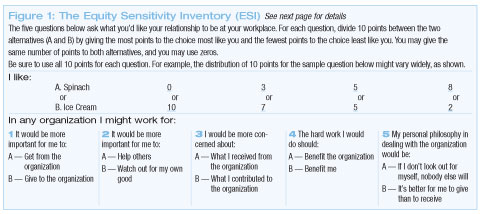
It’s the first warm and sunny day of spring, and you are stuck indoors. But not for long. Realizing no one will miss your absence, you slip out through a back exit. Suddenly you’re in your car and driving home to enjoy the marvelous climate.
As you drive, you think about what you just did. You intentionally sneaked away from work, and will get paid for the full day. Do you feel guilty and make a personal commitment to put in extra effort later to make up for this lost time? Or do you feel vindicated because you often do more than what’s required at work? You may feel neither of these emotions, because thoughts of contributing less than others at work this day don’t enter your mind.

An issue of equity
If you read myISHNcolumn last month, you noted the concept of “equity” in the opening scenario. Equity is a perception of relative fairness determined by people’s evaluation of their inputs (contributions) vs. outputs (benefits) in a particular situation, relative to the input/output ratio of others in the same or similar context. Leaving work early and receiving wages for a full day represents a relatively low input/output ratio compared to those who worked all day. In equity terms, you would be overcompensated for the day compared to your co-workers.Individual differences in equity perceptions
Readers’ answers to my questions about skipping out on work might vary substantially. For some, the thought of contributing less than their coworkers on a particular workday elicits no guilt feelings or motivation to increase personal effort on subsequent days. In contrast, other readers are very sensitive to variations in perceived fairness at work and would feel distress until their perceptions of inequity were eliminated.Let’s consider three different orientations toward equity, and their potential implications for actively caring for safety.
Benevolents:Benevolent individuals prefer their input/output ratio to be larger than the input/ output ratios of comparative others. Most are likely to actively care for the safety and health of others. These individuals would feel the most guilt after skipping a day of work, and would work hard on subsequent days.
Entitleds:Opposite to the benevolents are the entitled, who would feel no distress or guilt after sneaking a day off. Entitleds strive for low input/output ratios, and have high thresholds for feeling indebted. Any extra benefit they receive is their due, and they feel minimal obligation to reciprocate. These individuals are least likely to go beyond the call of duty on behalf of the safety or health of another person.
Equity sensitives:Equity sensitives subscribe to the norm of equity, and are most content when their input/output ratio at work is equal to that of their coworkers. They feel distress when undercompensated and guilt when overcompensated.
This is the only group that experiences both distress and guilt with regard to equity imbalance. Entitleds feel distress when underworked, but are satisfied when overworked. In contrast, benevolents experience guilt when overrewarded, but feel good when under-rewarded.
The Equity Sensitivity Inventory (ESI)
Figure 1 (shown on the previous page) includes a personality scale used to classify people into one of the three equity-sensitivity categories described above. The ESI is easy to administer and score. As indicated in Figure 1, participants merely distribute ten points between two alternatives per each of five questions. Then, the number of points given the benevolent alternatives for each question is summed, which are: 1B, 2A, 3B, 4A, and 5B.An individual is considered entitled if his or her score is less than 29; benevolent if his or her score is greater than 32, and equity sensitive if his or her score is between 29 and 32. Plus, the degree of an entitled vs. benevolent perspective is indicated by one’s score. For example, a score of 28 is only suggestive of an entitled state, whereas a score below 12 reflects a highly entitled personality.
Lively and informative group conversation can follow the administration and scoring of the ESI. Participants could discuss circumstances and contingencies that can increase a person’s ESI score, perhaps transitioning an attitude from entitled to equity sensitive, or from equity sensitive to benevolent.
This latter point presumes a person’s equity outlook is a mutable state rather than a stable trait. A person’s propensity toward benevolence (or actively caring) can be increased by establishing a relevant accountability system and/or by enhancing particular person states (specifically, self-esteem, self-efficacy, personal control, optimism, and belongingness).
I suggest you introduce equity theory to a work team and then administer and score the ESI. The accompanying individual introspection and group conversations can be instrumental in helping people develop an actively-caring mindset, leading to more actively-caring behavior throughout a workplace.
Editor’s Note:This marks Scott’s final column forISHN, after writing more than 200 columns for the magazine since 1990. On behalf ofISHN’s71,400 subscribers, the editors thank Scott for his time, energy and actively caring about the quality of each and every one of his contributions.
